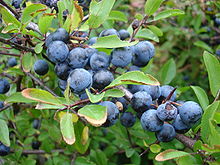Blackthorn
| Prunus spinosa | |
|---|---|
 |
|
| Fruit | |
| Scientific classification | |
| Kingdom: | Plantae |
| (unranked): | Angiosperms |
| (unranked): | Eudicots |
| (unranked): | Rosids |
| Order: | Rosales |
| Family: | Rosaceae |
| Genus: | Prunus |
| Subgenus: | Prunus |
| Section: | Prunus |
| Species: | P. spinosa |
| Binomial name | |
|
Prunus spinosa L. |
|
 |
|
| Distribution map | |
| Synonyms | |
|
List
|
|
Prunus spinosa (blackthorn, or sloe) is a species of Prunus native to Europe, western Asia, and locally in northwest Africa. It is also locally naturalised in New Zealand and eastern North America.
The specific name spinosa is a Latin term indicating the pointed and thornlike spur shoots characteristic of this species.
The common name "blackthorn" is due to the thorny nature of the shrub, and its very dark bark.
The word commonly used for the fruit, "sloe" comes from Old English slāh. The same word is noted in Middle Low German, historically spoken in Lower Saxony, Middle Dutch sleuuwe or, contracted form, slē, from which come Modern Low German words: slē, slī, and Modern Dutch slee, Old High German slēha", "slēwa, from which come Modern German Schlehe and Danish slåen.
The names related to 'sloe' come from the Common Germanic root *slaiχwōn. Cf. West Slavic / Polish śliwa; plum of any species, including sloe śliwa tarnina—root present in other Slavic languages, e.g. Croatian/Serbian šljiva / шљива.
...
Wikipedia
